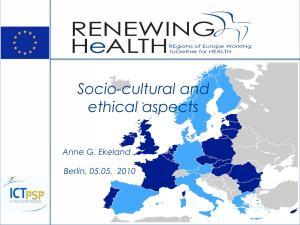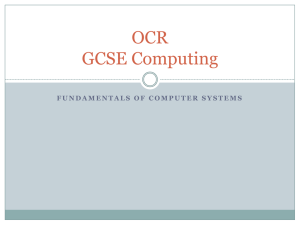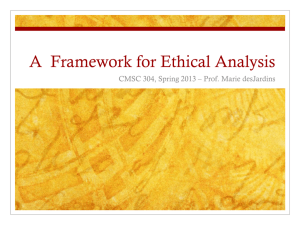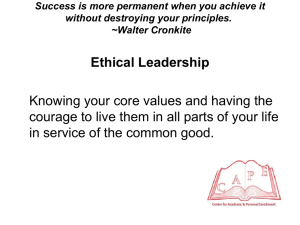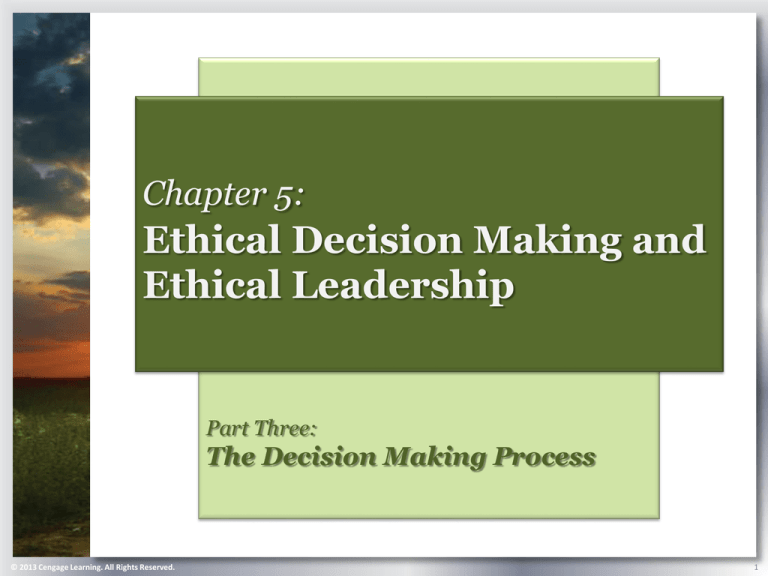
Chapter 5:
Ethical Decision Making and
Ethical Leadership
Part Three:
The Decision Making Process
© 2013 Cengage Learning. All Rights Reserved.
1
The Ethical Decision Making
Process
In business, people make decisions
differently than at home
Organizational pressures have a strong influence
The ethical decision making process includes
Ethical issue intensity
Individual factors
Organizational factors
The framework for ethical decision making
does not describe how to make ethical
decisions
Outlines the factors and processes related to
ethical decision making
© 2013 Cengage Learning. All Rights Reserved.
2
Framework for Understanding Ethical
Decision Making in Business
© 2013 Cengage Learning. All Rights Reserved.
3
Ethical Issue Intensity
The perceived relevance or importance of an
ethical issue to the individual, work group,
and/or organization
Reflects the ethical sensitivity of the individual and/or
work group
Triggers the ethical decision making process
Individuals are subject to six spheres of influence
Workplace
Family
Religion
Legal system
Community
Profession
Moral intensity: Relates to a person’s perception
of social pressure and the harm his/her decision
will have on others
© 2013 Cengage Learning. All Rights Reserved.
4
Individual Factors
People base their ethical decisions on their
own values and principles of right or wrong
Values are learned through socialization
Good personal values decrease unethical behavior and
increase positive work behavior
Values are subjective; vary across cultures
An organization may intend to do right, but
organizational or social forces can alter this intent
Research shows that various factors influence
ethical behavior
Gender–women are more ethical than males
Education, work experience, nationality and age affect
ethical decision making
© 2013 Cengage Learning. All Rights Reserved.
5
Locus of Control
Relates to individual differences in relation to a
general belief about how one is affected by
internal versus external events or
reinforcements
Managers with
External locus of control go with the flow because
that’s all they can do
Internal locus of control believe they can control
events; are masters of their destinies and trust in their
capacity to influence their environment
Unclear relationship between locus of
control and ethical decision making
© 2013 Cengage Learning. All Rights Reserved.
6
Organizational Factors
Organizational culture has a stronger influence
on employees than individual values
Corporate culture: A set of values, norms, and
artifacts that members of an organization share
Ethical culture: Reflects whether the firm has an ethical
conscience; is a function of many factors
Significant others: Those who have influence in a
work group
Obedience to authority: Helps to explain why
many employees unquestioningly follow superior’s
orders
© 2013 Cengage Learning. All Rights Reserved.
7
Opportunity
The conditions in an organization that
limit/permit ethical/unethical behavior
Immediate job context: Where employees work,
with whom they work, and the nature of the work
Opportunities for misconduct can be reduced by
establishing formal codes, policies, and rules
Aggressive enforcement is required
Knowledge can sometimes lead to unethical
behavior
•
© 2013 Cengage Learning. All Rights Reserved.
A person who has an information base, expertise, or
information about competition has an opportunity to
exploit knowledge
8
Office Supplies Reported Missing Most Often
© 2013 Cengage Learning. All Rights Reserved.
9
Business Ethics Evaluations and
Intentions
Ethical dilemmas involve situations where
rules are vague or in conflict
Critical thinking skills and ability to take
responsibility are important
The final step is deciding what action to take
based on a person’s intentions
Guilt or uneasiness is the first sign that an
unethical decision has occurred
Most businesspeople will make ethical
mistakes
© 2013 Cengage Learning. All Rights Reserved.
10
Using the Framework to Improve
Ethical Decisions
Impossible to objectively determine if a
business decision is right or wrong
Understanding how ethical decisions are made
will not solve ethical problems
Business ethics involves value judgments and
collective agreement about acceptable patterns of
behavior
Ethical decision making in business does not
rely on personal values and morals
Organizations take on cultures of their own
Informal relationships enforce an ethical culture
© 2013 Cengage Learning. All Rights Reserved.
11
Leadership in Corporate Culture
Leadership: The ability or authority to guide
and direct others toward achievement of a
goal
Leaders provide a blueprint for an organization’s
corporate culture and ethics
Leadership styles influence organizational
behavior
Including employee’s acceptance of/adherence to
organizational norms and values
A challenge for leaders is gaining trust and
commitment
© 2013 Cengage Learning. All Rights Reserved
12
The Managerial Role in Developing Ethics
Program Leadership
© 2013 Cengage Learning. All Rights Reserved.
13
Leadership Styles
Coercive leader: Demands instant obedience
and focuses on achievement, initiative, and
self-control
Authoritative leader: Inspires employees to
follow a vision, facilitates change, and creates a
strongly positive performance climate
Affiliative leader: Values people, their
emotions and needs, and relies on friendship
and trust to promote flexibility, innovation, and
risk taking
© 2013 Cengage Learning. All Rights Reserved.
14
Leadership Styles (continued)
Democratic leader: Relies on participation and
teamwork to reach collaborative decisions
Pacesetting leader: Can create a negative
climate because of the high standards that
he/she sets
Coaching leader: Builds a positive climate by
developing skills to foster long-term success,
delegating responsibility, and issuing
challenging assignments
© 2013 Cengage Learning. All Rights Reserved.
15
Leadership Styles (continued)
Transactional Leaders: Create employee
satisfaction through bartering for desired
behaviors/performance
Best-suited for rapidly changing situations,
including those requiring responses to ethical
problems or issues
Transformational leaders: Raise employees’
commitment and foster trust and motivation
Is best for organizations with high ethical
commitment and strong stakeholder support
© 2013 Cengage Learning. All Rights Reserved.
16
Habits of Strong Ethical Leaders
Developed by Archie Carroll; based on
Stephen Covey’s The 7 Habits of Highly
Effective People
Ethical leadership is based on holistic thinking
that embraces the complex issues that
companies face
© 2013 Cengage Learning. All Rights Reserved.
17
Habits of Strong Ethical Leaders
1
Ethical leaders have strong personal character.
2
Ethical leaders have a passion to do right.
3
Ethical leaders are proactive.
4
Ethical leaders consider stakeholders’ interests.
5
Ethical leaders are role models for the organization’s values.
6
Ethical leaders are transparent and actively involved in
organizational decision making.
7
Ethical leaders are competent managers who take a holistic view
of the firm’s ethical culture.
© 2013 Cengage Learning. All Rights Reserved.
18
Understanding Ethical Decision
Making and the Role of Leadership
Ethical issue intensity, individual factors, and
opportunity result in business ethics
evaluations and decisions
An organizational ethical culture is shaped by
effective leadership
Top level support is required for ethical behavior
An ethical corporate culture needs shared values
and proper oversight
The more you know about ethical decision
making, the more likely you will be to make
good decisions
© 2013 Cengage Learning. All Rights Reserved.
19




